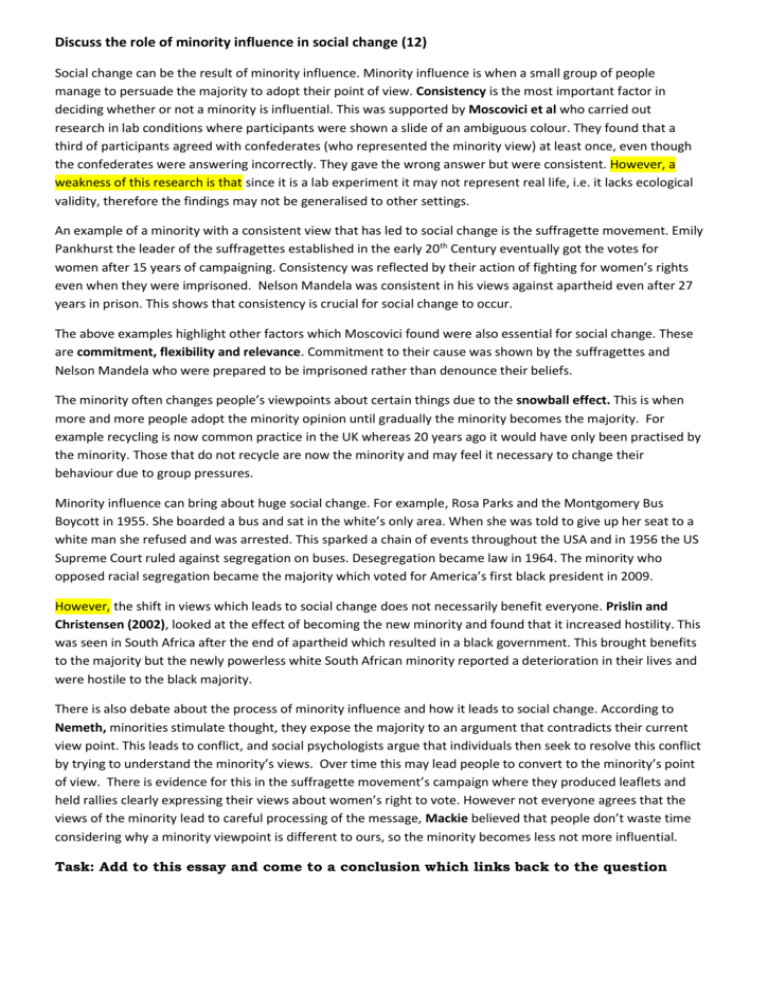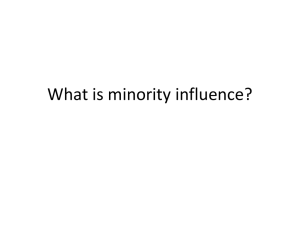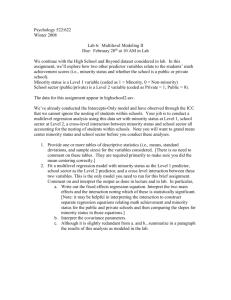Discuss the role of minority influence in social
advertisement

Discuss the role of minority influence in social change (12) Social change can be the result of minority influence. Minority influence is when a small group of people manage to persuade the majority to adopt their point of view. Consistency is the most important factor in deciding whether or not a minority is influential. This was supported by Moscovici et al who carried out research in lab conditions where participants were shown a slide of an ambiguous colour. They found that a third of participants agreed with confederates (who represented the minority view) at least once, even though the confederates were answering incorrectly. They gave the wrong answer but were consistent. However, a weakness of this research is that since it is a lab experiment it may not represent real life, i.e. it lacks ecological validity, therefore the findings may not be generalised to other settings. An example of a minority with a consistent view that has led to social change is the suffragette movement. Emily Pankhurst the leader of the suffragettes established in the early 20th Century eventually got the votes for women after 15 years of campaigning. Consistency was reflected by their action of fighting for women’s rights even when they were imprisoned. Nelson Mandela was consistent in his views against apartheid even after 27 years in prison. This shows that consistency is crucial for social change to occur. The above examples highlight other factors which Moscovici found were also essential for social change. These are commitment, flexibility and relevance. Commitment to their cause was shown by the suffragettes and Nelson Mandela who were prepared to be imprisoned rather than denounce their beliefs. The minority often changes people’s viewpoints about certain things due to the snowball effect. This is when more and more people adopt the minority opinion until gradually the minority becomes the majority. For example recycling is now common practice in the UK whereas 20 years ago it would have only been practised by the minority. Those that do not recycle are now the minority and may feel it necessary to change their behaviour due to group pressures. Minority influence can bring about huge social change. For example, Rosa Parks and the Montgomery Bus Boycott in 1955. She boarded a bus and sat in the white’s only area. When she was told to give up her seat to a white man she refused and was arrested. This sparked a chain of events throughout the USA and in 1956 the US Supreme Court ruled against segregation on buses. Desegregation became law in 1964. The minority who opposed racial segregation became the majority which voted for America’s first black president in 2009. However, the shift in views which leads to social change does not necessarily benefit everyone. Prislin and Christensen (2002), looked at the effect of becoming the new minority and found that it increased hostility. This was seen in South Africa after the end of apartheid which resulted in a black government. This brought benefits to the majority but the newly powerless white South African minority reported a deterioration in their lives and were hostile to the black majority. There is also debate about the process of minority influence and how it leads to social change. According to Nemeth, minorities stimulate thought, they expose the majority to an argument that contradicts their current view point. This leads to conflict, and social psychologists argue that individuals then seek to resolve this conflict by trying to understand the minority’s views. Over time this may lead people to convert to the minority’s point of view. There is evidence for this in the suffragette movement’s campaign where they produced leaflets and held rallies clearly expressing their views about women’s right to vote. However not everyone agrees that the views of the minority lead to careful processing of the message, Mackie believed that people don’t waste time considering why a minority viewpoint is different to ours, so the minority becomes less not more influential. Task: Add to this essay and come to a conclusion which links back to the question








